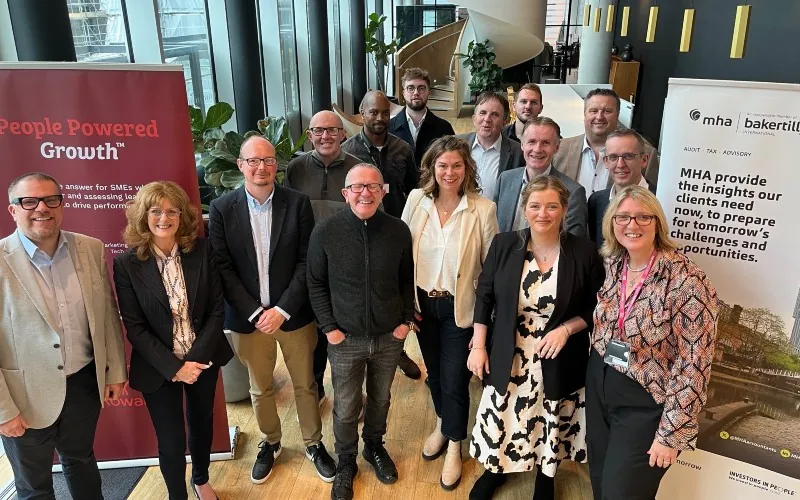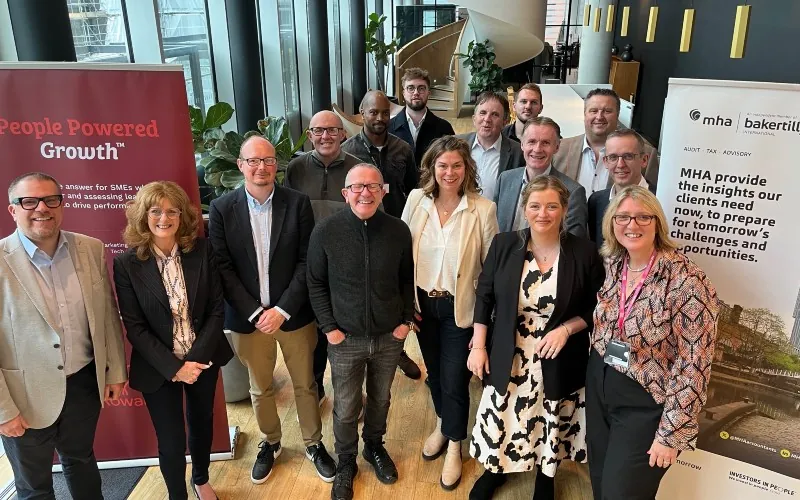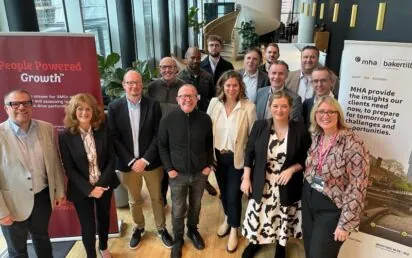We’ve all heard the phrase ‘turnover is vanity, profit is sanity’ but how do you achieve profitable growth in uncertain economic times?
That was the theme of BusinessCloud’s latest roundtable with MHA and Rowan Group.
People, people, people
Tom Dunlop is the CEO and founder of LegalTech Summize which was founded in 2018 and has reported four consecutive years of 100 per cent ARR growth. In 2022 the company secured £5m in Series A funding from YFM Equity Partners & Maven Capital Partners.
He said: “There’s a lot of talk about strategy, metrics and process but getting the right people in at the right time is probably the biggest way to unlock growth.”
Choose a machine gun over a machete
Richard Law is the chair of product intelligence platform vypr and is the former CEO of GB Group.
He said growth comes down to three things: Market fit; vision; listening to your team.
Law explained: “The first thing I’d say, whatever market you’re in, is get yourself in the right position for that market. If you’ve got room to grow the chances are you can grow.
“Secondly, have a really great plan on how you’re going to grow and that’s a detailed plan you can share with your whole team regularly. That team should be the best you can possibly get.
“The next thing is to make sure your product is as differentiated as it can be. If you’re going to war you want to go in with a machine gun and not a machete. You want to be easy to love and hard to leave. Always be thinking ahead about what can go wrong and have money.”
Keep innovating
Harry Panter is the CEO and founder of student housing app Housr, which has 59 staff and a US office.
He said: “You have to set yourself up to constantly innovate, constantly be a market fit. Just because you’ve got it one day doesn’t mean you can sustain it long-term. The market can change.
“The biggest thing for me is set yourself up to a point so you can listen to your customers and those customers can provide a complete feedback loop to your development team to constantly change your product in line with what they’re saying.
“Don’t under-estimate the power of board support at such an early stage in a startup. I’ve been able to create a spiderweb of firefighters.”
Celebrating diversity
Jen Atkinson is the CEO of Travel Seen and the former CEO of ITC Luxury Travel.
She said: “This table is a group of really inspiring entrepreneurs of different shapes, ages and genders and I love that. I love the fact you think an entrepreneur has to be 24 and this, that and the other tech. I always get a lot of energy being around a table of brilliant people doing great things.

Growth roundtable sponsored by MHA and Rowan Group
“I think from my personal perspective it’s all about investment versus return and the return in terms of the value you’re creating in the business. Ultimately everybody wants an exit and exits are driven by sales growth and value creation.
“You can’t grow a business without investment. Where are you getting that investment from? How do you know the people you are getting that money from are going to be the right people for your journey?”
Solid base
Business consultant Simon Gibson is the former CEO of Spirant Group and said a solid base was the key to growth.
“Make sure you have solid foundations,” he said. “There are so many businesses that don’t do this. To grow requires a solid platform.
“This is where so many businesses fall down. They do something great and make an assumption that it’s capable of being replicated in new markets and potentially new countries without looking at their platform.
“It you’re embarking on an investment journey and you’re ambitious about growth don’t underestimate the importance of getting your business structure right and being in a position where you’re anticipating challenge.”
Product fit is key
Justin Gilchrist is the founder and CEO of Wellbox, which uses technology to help businesses send curated gifts, branded merchandise and wellness packages to remote employees, event attendees, clients and work-from-home staff.
He said: “The key takeaway from today is I’m always surprised at how many fascinating companies there are around the North West. We’re nowhere as vocal as Shoreditch and London.
“For us it’s really important to understand what product market fit is. If you try and scale or you take investment before you have that. It’s like running with scissors. Theoretically you can keep going but you’re going to hit a point where you’re going to stagnate and you find it really difficult to grow.”
Don’t do it all on your own
Lesley Calland is the founder and CEO of B2B coaching platform myonlinecoach.
Calland said: “While I’m probably the oldest founder my business is at baby stages. The founder journey isn’t easy. Don’t try and do too much on your own.
“I’m very conscious that I’m spinning 23 plates at the moment as a sole founder. I’m not daunted by that because I’m a great multitasker but the more I continue to do that the more I will hinder my growth.
“I’ve got to think about what are the leapfrogs that I need to achieve in order to get that level of momentum going.”
Calland also warned people not to listen to too many external voices because it will cloud your judgement.
Do your research
Tim Ternent is the CEO of NetHub, which is a platform that helps event organisers and membership organisations increase their profits.
He said: “People are key in our business. Research is key. Get out there, take it from the horse’s mouth. Speak to people. A lot of people give advice over product market fit. Product market fit and customer adoption are two very different things.”
Don’t obsess about growth
Ian Hudson is the managing director of IT consultancy Hudson Hill Consulting, which has employed a buy-and-build strategy.
He said: “Don’t get too obsessed by the growth at the expense of losing the things that made you get you there in the first place. Look after your customers, making sure you’re servicing what they do.
“Focus on your staff, making sure that they’re achieving what they want to achieve in life and then the growth follows.”
Be brave and go for it
Sarah Bateman is the CEO of Unify Energy, which is part of the Bruntwood Group.
She said: “I’ve been really inspired and motivated by a really consistent great table of people and it does make you feel less lonely when you’re scrabbling to try and make things work. I’ll take that away with me.

Sarah Bateman, CEO of Unify Energy
“In terms of growth that stability and foundation to build on is so important rather than that Monopoly money game of exits. At some point you’ve got to be brave and go for it.”
Leadership is key
Rob Richardson is a partner of MHA and said leadership is pivotal to business growth.
He said: “It’s been fascinating to hear everyone’s stories. When I look back at the really good businesses I’ve worked with over the years that have delivered on that profitable growth, they’ve all had one common characteristic – and that’s strong leadership.
“It’s the focus on the vision, the plan and doing the right thing for the people around them rather than the numbers that I think delivers the ultimate value and that profitable growth.”
Fearless
Louise Stephenson, is a partner of Drax Private Equity team across the North and has played a pivotal role at Rowan.
She said: “The word I’ve put down here is fearless. Everyone we’re listening to here isn’t really worried about the budget on October 30. You’re all just going for it. It’s great for Manchester that we’ve got such great entrepreneurs in the room. Not one of you has mentioned being nervous about what’s going to happen. You just find a way.
“We talk about people but we’ve not really used the word culture. For me having the right culture in the business is really important. Ultimately it’s the culture that drives your business.’
Don’t ignore tax advantages
Sean Mitchell is a partner of MHA, specialising in tax.
He said: “Taxes are market imperfection. As a market imperfection it can have either an enabling effect on the growth that businesses are looking to achieve or it can be detrimental.
“We’ve heard people talk about people being important to their business. You’re looking to reward, retain, attract top talent to take you to that growth and there are tax aspects to that. Don’t overlook them.
“In an economic backdrop of rising taxes then the reliefs that are available became more and more valuable and could potentially differentiate you or get the right person in.
“Capital investment to fund growth is also important. You can do that in a good way and have some positive tax advantages.”
Clear focus
Peter Holt is the managing director of Rowan Executive Search
He said: “Having a clear focus on your market and knowing that market has opportunity for growth (is important).
“When we’re working with a lot of businesses we sometimes see that they end up focusing too much internally and are challenged about how do they make their business more efficient and make it better rather than think ‘what are we really trying to achieve and what problems are we trying to solve?’”


